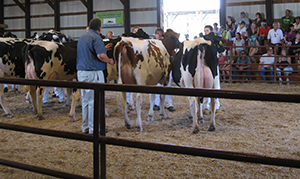 You had success in judging contests as a youth. Now, you'd like to move onto the next level and judge dairy shows. What should you know?
You had success in judging contests as a youth. Now, you'd like to move onto the next level and judge dairy shows. What should you know?I spoke with someone who has handled the judge selection process for state and regional fairs for over 15 years. Some information they take into consideration:
- Requirement for the show (approved lists by PDCA or breed organizations)
- Past judging experience
- Judging reputation, attitude toward exhibitors, personal behavior, and so forth
Show management will contact a potential judge to check on the date availability. They can be asked if they have sold animals - which they could later be evaluating. The fair management then takes that information under advisement. If selected, a contract is sent.
On show day, the judge is expected to arrive at least 20 to 30 minutes early to meet with the dairy staff and go over the day's logistics. Each show varies, but plan your attire appropriately. For an outdoor show in mid-July, a three-piece suit will make you quite uncomfortable in the sweltering heat. However, judging in shorts and sneakers is not appropriate either.
Most shows require judges to refrain from being on the grounds prior to show day. Additionally, spending time with exhibitors in a business or social setting just prior to judging is also frowned upon. Even if the best cow won, people may still talk about the judge enjoying dinner and drinks with the owners of the champion the night before.
Socializing with the exhibitors after the show is commonplace. Walking through the barns, paying compliments to exhibitors on a good day or a nice heifer, is a gesture appreciated by many fair officials and exhibitors. Always remain professional. Your actions will follow you and could cost you future judging assignments.
Judges who evaluate showmanship need to talk to the exhibitors because they can learn a great deal. A judge that takes time to talk to exhibitors and makes the participants' time seem valuable will gain more respect than if he just placed the classes correctly.
So, if you happen to be someone wanting to judge shows, it is good to know the expectations. Exhibiting should be a positive learning experience, and both parties should understand and appreciate it.

The author is the online media manager and is responsible for the website, webinars and social media. A graduate of Modesto Junior College and Fresno State, she was raised on a California dairy and frequently blogs on youth programs and consumer issues.






